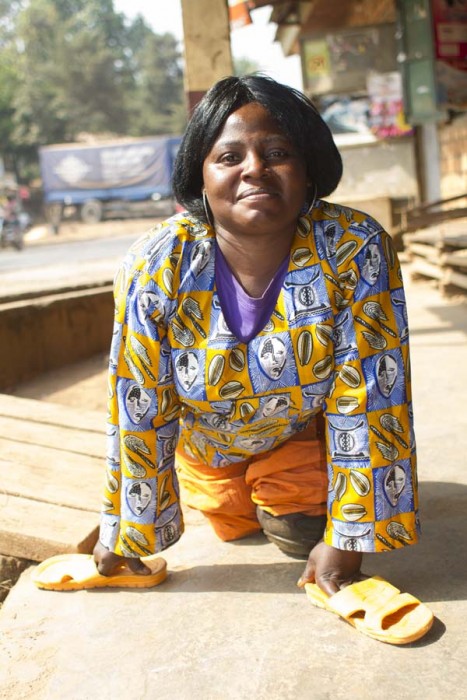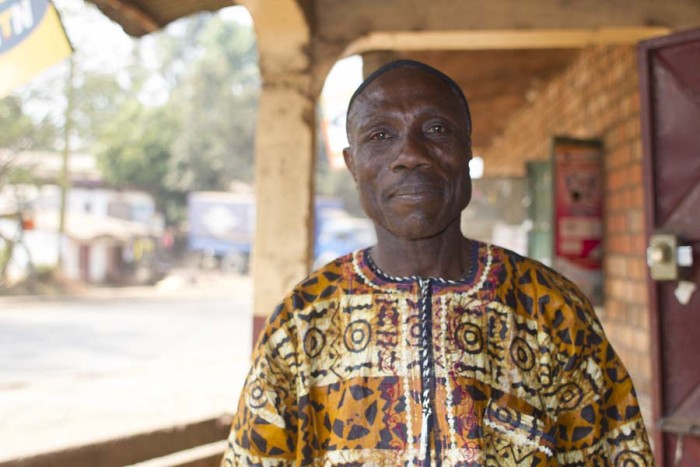January 6th, 2015 by Rachel | Tags: Disability, Peace Corps | 1 Comment »
Last week, as I was sitting in the main entrance area of the Coordination Unit of Association for Persons with Disability office, a woman crawled in through the doors. I wanted to drop my jaws. I immediately blurted out loud to my work supervisor, “This woman is crawling in!” As the woman continued to crawl in, I noticed that she was wearing knee pads and wearing slip-on shoes on her hands. As soon as she sat down by pushing herself up onto a chair, we introduced each other. She was the most vibrant, bubbly and friendly woman. She was always smiling and seemed to have so much energy. She came from a town about four hours outside of Northwest for a meeting with a handful of other person with disability from other parts of Northwest. I asked her why she doesn’t have a wheelchair. She said that she does have a wheelchair and also a tricycle but prefers to crawl most of the time because taxi drivers will not offer her a ride or charge a much higher fare for wheelchair users because the drivers have to take the time to help the person get in the car and put the wheelchair in the trunk. So, she find that crawling gives her the freedom to be able to take taxis as often as persons without disability and at the same price as them. This situation highlights an example of how empowered and hardworking people with disabilities can be as they are willing to be flexible and not allow obstacles stop them from reaching their destinations. However, this is a serious injustice. The most ideal solution would certainly be replacing all taxis with the same design taxis that are used in the United Kingdom. The taxis in the United Kingdom are designed in a way that wheelchair users can easily roll into the car without having the driver spend a lot of time helping them. Obviously, this solution sadly would not work in Cameroon for the time being due to financial reasons.

A woman with disability often moves on her knees.
She did at one point have braces when she was a child and used crutches but she outgrew braces and was never able to acquire a new set of braces.
As I talked more with this woman, she told me that she believes that she became paralyzed from malaria which she had when she was five years old. This was the first story I have heard in person from someone who became disabled from malaria.

This gentleman is able to walk without any assistance after having numerous operations.
Then a gentleman from another town outside of Bamenda walked in. I asked him what kind of disability he has. He told me that he has a mobility disability. He was in an accident many years ago. He was unable to use one of his legs for four years and had to walk with crutches. He couldn’t get water from the pump by himself and had let his wives do it for him. Today, he gets water by himself with no assistant as he can walk well without crutches. The only issue he has with his leg is that it doesn’t bend as well as it used to. I asked him why he is able to walk again. He told me that it was because he had numerous operations and didn’t give up until his leg was fixed. He was able to have the operations because he had the financial means. This is an example where money unfortunately plays an injustice role in how well people are able to access good quality of healthcare.
I spent some time talking with a few other people with disability who came from outside of Bamenda for the meeting. The issues they face are almost no different from people with disability who I have met in Bamenda. For all of them, their disability was acquired later in life. One acquired mobility disability from quinniamax injection. Three others became disabled from accidents. One became blind from bacteria in a river. All except for one don’t have direct water access and require their children or family members to get water from the pump, well or stream.

1 Comment
Bayla
January 7, 2015 at 1:00 pm
Another wonderful blog!! Rachel!! This is so interesting!
Love
Bubby